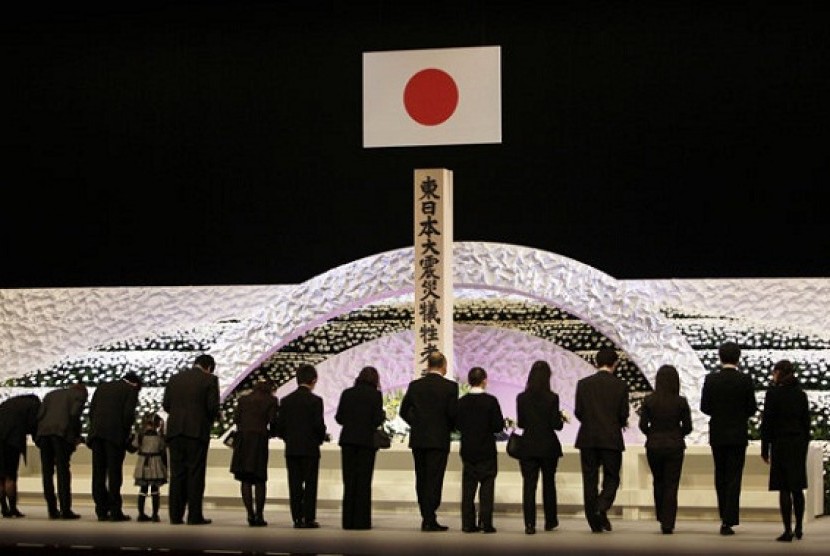REPUBLIKA.CO.ID, TOKYO - Amid growing dissatisfaction with the slow pace of recovery, Japan marked the second anniversary Monday of the devastating earthquake and tsunami that left nearly 19,000 people dead or missing and has displaced more than 300,000.
Japanese Prime Minister Shinzo Abe said that the government intends to make "visible" reconstruction progress and accelerate resettlement of those left homeless by streamlining legal and administrative procedures many blame for the delays.
"I pray that the peaceful lives of those affected can resume as soon as possible," Emperor Akihito said at a somber memorial service at Tokyo's National Theater.
At observances in Tokyo and in still barren towns along the northeastern coast, those gathered bowed their heads in a moment of silence marking the moment, at 2:46 pm on March 11, 2011, when the magnitude 9.0 earthquake — the strongest recorded in Japan's history — struck off the coast.
Japan has struggled to rebuild communities and to clean up radiation from the Fukushima Dai-ichi nuclear plant, whose reactors melted down after its cooling systems were disabled by the tsunami. The government has yet to devise a new energy strategy — a central issue for its struggling economy with all but two of the country's nuclear reactors offline.
About half of those displaced are evacuees from areas near the nuclear plant. Hundreds of them filed a lawsuit Monday demanding compensation from the government and the now-defunct plant's operator, Tokyo Electric Power Co., or TEPCO, for their suffering and losses.
"Two years after the disasters, neither the government nor TEPCO has clearly acknowledged their responsibility, nor have they provided sufficient support to cover the damages," said Izutaro Managi, a lawyer representing the plaintiffs.
Throughout the disaster zone, the tens of thousands of survivors living in temporary housing are impatient to get resettled, a process that could take up to a decade, officials say. A change of government late last year has raised hopes that authorities might move more quickly with the cleanup and reconstruction.
Since taking office in late December, Abe has made a point of frequently visiting the disaster zone, promising faster action and plans to raise the long-term reconstruction budget to 25 trillion yen (262 billion USD) from 19 trillion yen (about 200 billion USD).
"We cannot turn away from the harsh reality of the affected areas. The Great East Japan Earthquake still is an ongoing event," Abe said at the memorial gathering in Tokyo. "Many of those hit by the disaster are still facing uncertainty over their futures."
Following the Fukushima disaster, Japan's 50 still viable nuclear reactors were shut down for regular inspections and then for special tests to check their disaster preparedness. Two were restarted last summer to help meet power shortages, but most Japanese remain opposed to restarting more plants.
The government, though, looks likely to back away from a decision to phase out nuclear power by the 2030s. Abe says it may take a decade to decide on what Japan's energy mix should be.
___



